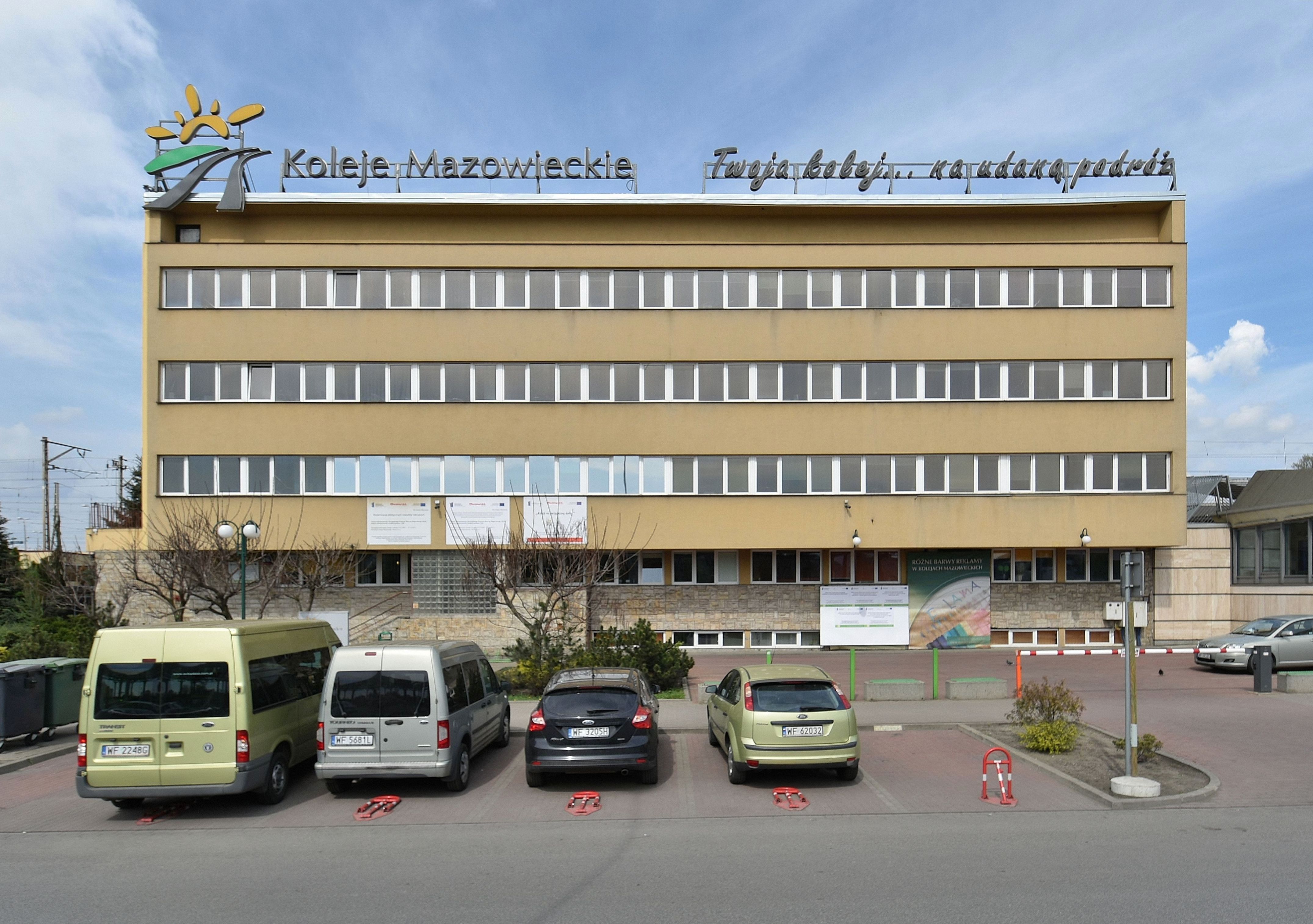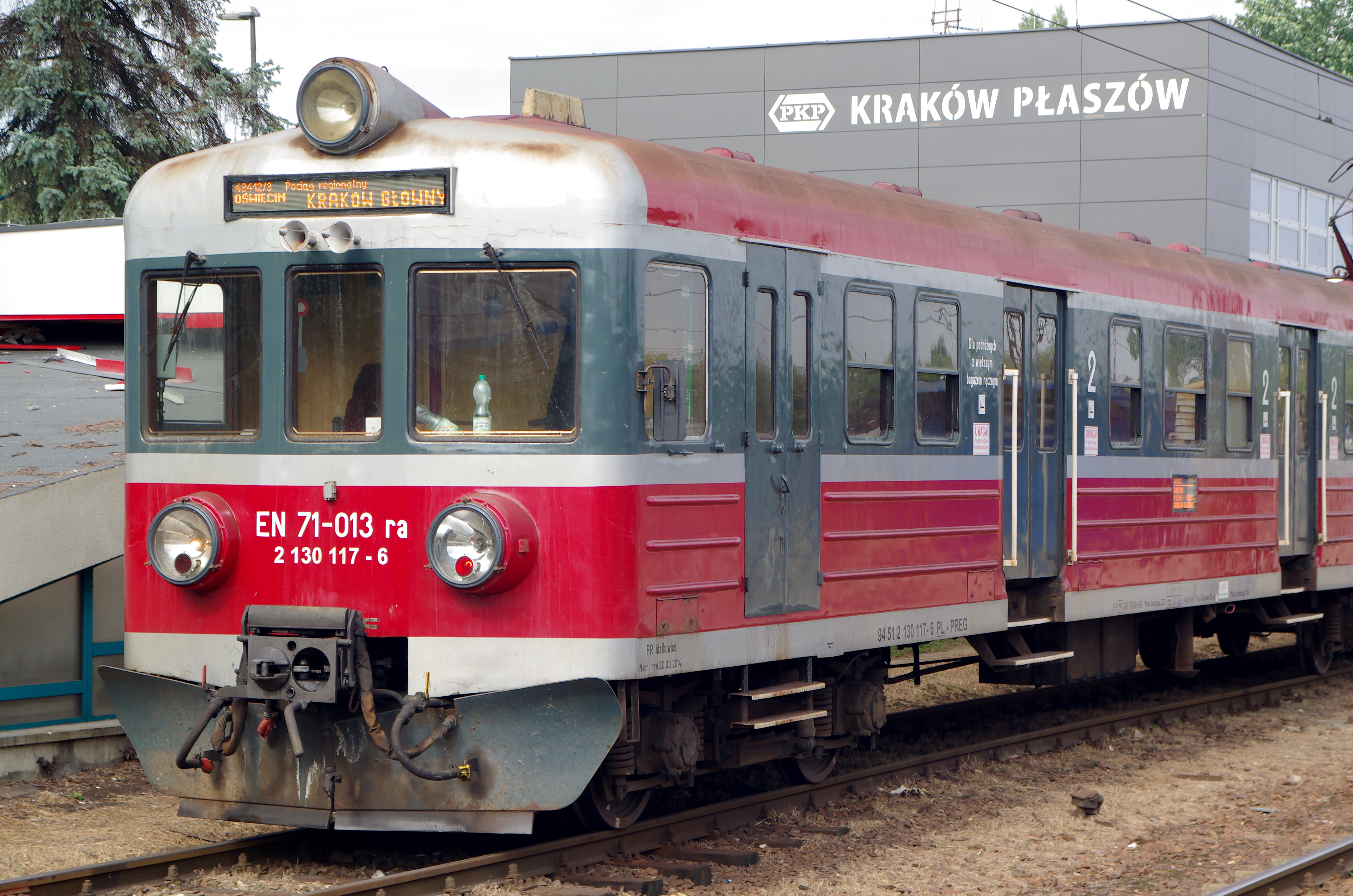|
EN57
EN57 (manufacturer's designation: Pafawag 5B/6B) is an electric multiple unit used by the Polish railway operator (''PKP''). It was built for suburban and long-distance services. Presently it is used by Przewozy Regionalne (Polregio), Łódzka Kolej Aglomeracyjna, SKM Trójmiasto, Koleje Dolnośląskie, Koleje Śląskie and Koleje Mazowieckie companies in Poland. History Designed for regional transport, class EN57 was based on the earlier class EW55 units. EW55 were the first electrical multiple units built in Poland with 100% domestic components. They were built by Pafawag works in Wrocław. Production started in 1962 and ended in 1993 with 1452 trainsets produced, many of which are still in operation. This class is believed to have had the longest production period in the world for electric multiple units. The first-generation units had first-class compartments, but units numbered 602 and upwards were produced with only second class. Due to very long production period, t ... [...More Info...] [...Related Items...] OR: [Wikipedia] [Google] [Baidu] |
Szybka Kolej Miejska (Tricity)
PKP Szybka Kolej Miejska w Trójmieście Sp. z o.o. (); approximate English translation Tricity Rapid Transit Rail Ltd., usually abbreviated SKM, is a public rapid transit system in Poland's Tricity area (Gdańsk, Sopot and Gdynia), in addition reaching out to Lębork (which is 59 km west of Gdynia), Kartuzy and Koscierzyna; its service extended in the past also to Słupsk, Pruszcz Gdański, Tczew, Elbląg, or even as far as to Iława. The SKM functions as a rapid transit and commuter rail service for the Tricity, operating frequent trains on the central section between Gdańsk and Gdynia, and less frequently to outlying sections. The SKM route has 27 stops covering the Tricity between Gdańsk, Gdynia and Wejherowo. The SKM was established after World War II ended in 1945, when the cities of the Tricity, which had previously been divided under Polish and non-Polish administrations, all became part of Poland. For the first 24 years, from the start of SKM service in January ... [...More Info...] [...Related Items...] OR: [Wikipedia] [Google] [Baidu] |
Koleje Dolnośląskie
Koleje Dolnośląskie (Polish for ''Lower Silesian Railways''; KD) is a regional rail operator in the Lower Silesian Voivodeship of Poland. The company was founded on 28 December 2007 by a decision of the Lower Silesian Voivodeship Sejmik and is fully owned by the local government. Train categories The only train category operated by KD is local passenger trains (''osobowy''). Apart from KD's own tickets, tickets for Polregio's ''Regio'' trains are accepted on board of KD trains. Rolling stock At first, the rolling stock consisted of diesel units provided by the Lower Silesian voivodeship government which had previously been used by Przewozy Regionalne (now known as Polregio): one SA106, one SA132, three SA134 and three SA135 Diesel multiple units. Additional Diesel units were purchased in 2010 (three SA135 vehicles), 2011 (three SA134 vehicles) and 2015 (modern Pesa Link units marked as SA139). Koleje Dolnośląskie obtained their first electric multiple unit from ... [...More Info...] [...Related Items...] OR: [Wikipedia] [Google] [Baidu] |
Koleje Śląskie
Koleje Śląskie (Polish for Silesian Railways; KŚ) is a regional rail operator in the Silesian Voivodeship of Poland. The company was founded in 2010 and is fully owned by the local government. It started servicing in October 2011. Lines Rolling stock Gallery file:EN57-1178, Katowice, 2014-08-17 (Muri WK14).jpg, EN57AKŚ file:EN57-3002 Glebce.jpg, EN57KM file:EN71AKS-100.jpg, EN71AKŚ file:EN75-003 Laliki (02).jpg, EN75 ''FLIRT'' file:EN76-007 Koleje Śląskie.jpg, EN76 ''Elf'' file:14WE-03, Skierniewice, 2017-03-08.jpg, 14WE file:Pesa ELF II (21WEa-002), Katowice.jpg, 21WEa ''Elf II'' file:22WEd KŚ Bielsko-Biała 1.jpg, 22WEd ''Elf II'' file:27WEb-003 Katowice peron3.jpg, 27WEb ''Elf'' file:34WEa-002A na szlaku Tarnowskie Góry - Nakło Śląskie.jpg, 34WEa ''Elf II The Netronics ELF II was an early microcomputer trainer kit featuring the RCA 1802 microprocessor, 256 bytes of RAM, DMA-based bitmap graphics, hexadecimal keypad, two digit hexadecimal LED disp ... [...More Info...] [...Related Items...] OR: [Wikipedia] [Google] [Baidu] |
PKP Class EN71
The EN71 (manufacturer's designation: Pafawag 5Bg/6Bg) is a four-carriage Polish EMU constructed for the Polish National Railways (PKP). It is based on the three-carriage EN57, but differs in that it has an additional motor carriage. History The series was designed to replace the EN57, which was struggling to cope with the steep inclines of the Kraków - Zakopane route. Twenty EN71s were built at the PaFaWag works in 1976 and a further 30, or so, were manufactured in 1984 using individual EN57 units. The original twenty EN71s had bodywork made from corrugated metal; units with numbers above 20 are built from EN57s and can, therefore, have bodywork made from either flat or corrugated metal panels. Construction The EN71 is made up of four carriages: two with cabs; two with motors. The former (factory designation 5B) are marked as ra — where r stands for ''rozrządczy'' (the Polish term for control car) and a signifies that this is the front end of the train — and rb. T ... [...More Info...] [...Related Items...] OR: [Wikipedia] [Google] [Baidu] |
Przewozy Regionalne
Polregio (formerly ''Przewozy Regionalne'') is a train operator in Poland, responsible for local and interregional passenger transportation. Each day it runs approximately 3,000 regional trains. In 2002 it carried 215 million passengers. The company was founded in 2001 from the splitup of the PKP Passenger Transport Sector of the once-unitary '' Polskie Koleje Państwowe'' national rail operator into several companies to meet European Union requirements. Train categories ;REGIO (R) :local passenger train, 2nd class only, stops (usually) at all stations ;REGIOplus :semi-fast local passenger train, 2nd class only, stops at a limited number of stations, same fare as Regio ;interREGIO (IR) :low-cost inter-regional fast train, 2nd class only, stops at medium and major stations only; since 1 September 2015 only on routes Łódź – Warszawa and Ełk – Grodno (Belarus), due to company's economics and restructuring. ;REGIOekspres (RE) :fast trains on international route ... [...More Info...] [...Related Items...] OR: [Wikipedia] [Google] [Baidu] |
PKP Class ED72
The ED72 (manufacturer's designation: Pafawag 5Bs/6Bs) is a Polish four-car, long distance EMU operated by Przewozy Regionalne (Polregio). Like its cousin ( EN71), the ED72 is based on the EN57 and became the basis for its successor: the ED73. History Between 1993 and 1997, a mere 21 units were built by Pafawag. The newly built ED72s were assigned to large interregional transit operations in the towns of Poznań, Szczecin, Kraków, and Bydgoszcz. The series was created as an "upmarket" replacement for the more spartan EN57 and EN71 electric multiple units. Unfortunately, the express passenger service, InterRegio, for which the series was designed didn't find the ED72 to be quite as comfortable as they had hoped. Currently, all 21 units are still in use, servicing mostly InterRegio and some local Regio and RegioPlus trains. Modifications The ED72 introduced a number of innovations over the previous series of EMUs. Amongst these was converting the rb (rear control cars) secti ... [...More Info...] [...Related Items...] OR: [Wikipedia] [Google] [Baidu] |
Koleje Mazowieckie
Masovian Railways, in Polish Koleje Mazowieckie, is a regional rail operator in the Masovian Voivodeship of Poland. History The company was founded in 2004 as a joint venture of the Masovian Voivodeship, with 51% shares, and the, then government-owned, PKP Przewozy Regionalne, with 49% shares, to handle local passenger traffic in the Voivodeship. It started operating on 1 January 2005. Since the end of 2007 Masovian Railways has been fully owned by the Masovian Voivodeship. Rolling stock At the beginning the rolling stock consisted of old electric multiple units taken over from PKP. These were gradually modernised, and further units purchased second-hand from other operators. Later on, the company purchased or leased new rolling stock. As of 2010 the Masovian Railways had just under 200 PKP class EN57, five EN71 and two EW60. Additionally the company purchased seven DB Class 627 railcars and four 628 diesel multiple units to serve on non-electrified routes. In 2008 the ... [...More Info...] [...Related Items...] OR: [Wikipedia] [Google] [Baidu] |
Pafawag
Pafawag (Państwowa Fabryka Wagonów) ( English: National Rail Carriage Factory) is a Polish locomotive manufacturer based in Wrocław. The company became part of Adtranz in 1997 as Adtranz Pafawag, and in 2001 part of Bombardier Transportation. It is now part of the company Alstom History The factory opened in 1833 as Linke-Hofmann-Werke, Breslau, and became one of the major production centres for rolling stock in Europe. By the end of the Second World War most of the factory had been destroyed, and after the War the city of Breslau became part of Poland. In 1953 the company was renamed Pafawag. In 1953 the company produced the EP-02, the first Polish electric locomotive manufactured after World War II. In the late 1980s to mid 1990s the company experienced increasing economic problems due to lack of orders causing loss of production and lower employment. In 1997 ABB DaimlerBenz Transportation (ADtranz) acquired a majority share in the company. The Adtranz group (Dai ... [...More Info...] [...Related Items...] OR: [Wikipedia] [Google] [Baidu] |
Slovenian Railways
Slovenian Railways ( sl, Slovenske železnice, ''SŽ'') is the state railway company of Slovenia, created in 1991. Slovenia is a member of the International Union of Railways (UIC). The UIC Country Code for Slovenia is 79. History What is now Slovenia received its first railway connection in the 1840s, when the Austrian Empire built a railway connection – Südliche Staatsbahn or Austrian Southern Railway – between its capital, Vienna, and its major commercial port, Trieste. Thus, Maribor was connected by railway to Graz in 1844. The stretch was extended via Pragersko to Celje in 1846, and further via Zidani Most to Ljubljana in 1849. A double-track line was continued via Postojna, Pivka, and Divača, finally reaching Trieste in 1857. Before World War I, numerous other railways were built. In 1860, Pragersko was connected to Ormož and further to Čakovec, Croatia, thus connecting the Austrian and the Hungarian parts of the empire. In 1862, a single-track railway (expande ... [...More Info...] [...Related Items...] OR: [Wikipedia] [Google] [Baidu] |
Newag
Newag S.A. ronounced: nevagis a Polish company, based in Nowy Sącz, specialising in the production, maintenance, and modernisation of railway rolling stock. The company's products include the 14WE, 19WE, 35WE types electric multiple units; it has also developed the Nevelo tram. History In 1876 the Royal Railway Workshop opened, serving a newly built Austrian railway line. After the First World War the establishment, renamed "1st Class Main Workshop" served Polish State Railways, employing some 1800 workers in 1922. In post-World War II communist Poland the workshop was nationalised and later became a separate, though still state-owned, enterprise officially called "Nowy Sacz Railway Rolling Stock Repairs Depot in Nowy Sacz, State Independent Enterprise" ( pl, Zakłady Naprawcze Taboru Kolejowego "Nowy Sącz" w Nowym Sączu, Przedsiębiorstwo Państwowe Wyodrębnione ), with a workforce of about 3,500 in 1952. The last steam locomotive was serviced in 1972. After the fall ... [...More Info...] [...Related Items...] OR: [Wikipedia] [Google] [Baidu] |
Pojazdy Szynowe Pesa Bydgoszcz
Pesa (Pojazdy Szynowe Pesa Bydgoszcz) is a Polish company manufacturing railway vehicles based in Bydgoszcz. The name 'Pesa' derives from the initials PS which stand for ''Pojazdy Szynowe,'' 'railway vehicles' in Polish. Pesa is a successor to the Bydgoszcz repair shops of PKP ''Polskie Koleje Państwowe,'' Polish State Railways. From the 1950s until 1998 the repair shops operated under the name ZNTK Bydgoszcz, ''Zakłady Naprawcze Taboru Kolejowego,'' 'Repair Shop for Railway Rolling Stock' in Bydgoszcz. For most of its history the Bydgoszcz shop overhauled and repaired steam locomotives and freight cars. After the collapse in 1989 of the Communist regime in Poland the ZNTK Bydgoszcz repair shop was spun off in 1991 as an independent company. This led to a re-thinking of the firm's activities, and in 2001 the company was renamed ''Pojazdy Szynowe Pesa Spółka Akcyjna Holding'' (its present name) and its activities were re-oriented away from repair to the construction of ... [...More Info...] [...Related Items...] OR: [Wikipedia] [Google] [Baidu] |






_Trako13.jpg)
.jpg)